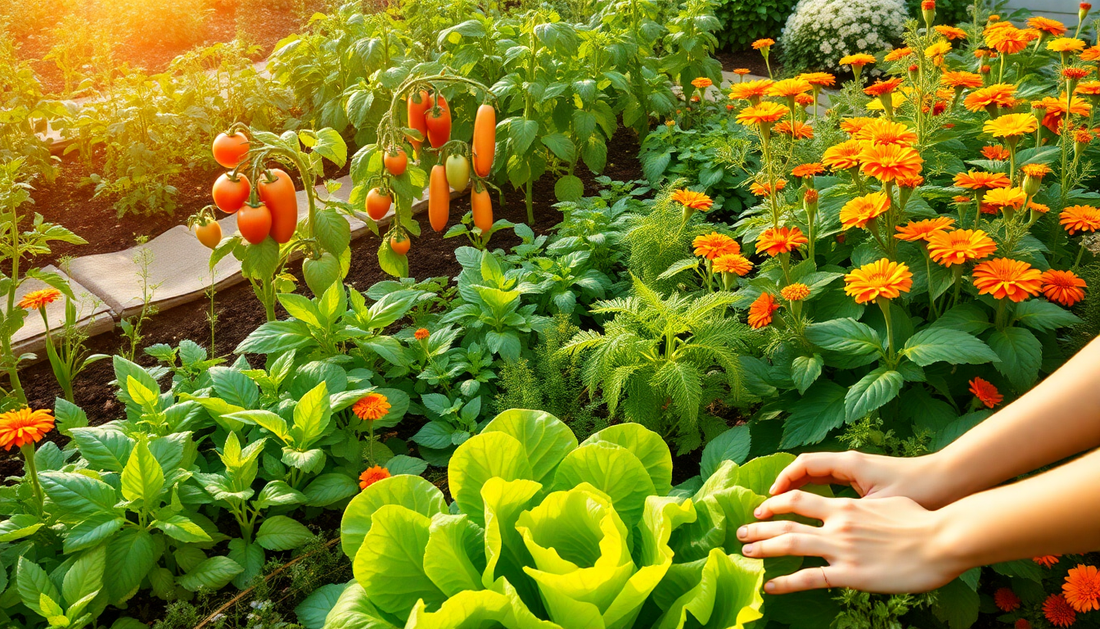
Companion Planting: The Secret to a Thriving Vegetable Garden
Share
In the ever-evolving world of sustainable gardening, one technique has stood the test of time - companion planting. This age-old practice not only enhances the health and productivity of your vegetable garden but also creates a harmonious ecosystem that benefits both plants and gardeners alike. At Idyl, your one-stop shop for all things gardening in Bangalore, we're excited to share our top companion planting tips to help you cultivate a bountiful and vibrant vegetable garden.
The Power of Companion Planting
Companion planting is the strategic placement of different plants in close proximity to one another, leveraging their natural synergies to create a mutually beneficial relationship. This approach goes beyond simply growing a variety of vegetables; it's about understanding the unique characteristics and needs of each plant, and then using that knowledge to your advantage.
Pest Control: Nature's Organic Pest Management
One of the primary benefits of companion planting is its ability to deter pests naturally. Certain plants, such as marigolds, can repel harmful insects like aphids, while others, like basil, can attract beneficial predators that feed on common garden pests. By strategically placing these "companion" plants around your vegetables, you can create a natural barrier against unwanted visitors, reducing the need for harsh chemical pesticides.
Nutrient Cycling and Soil Health
Companion planting also plays a crucial role in maintaining the health and fertility of your soil. Some plants, like legumes, have the ability to fix nitrogen in the soil, enriching the environment for their neighbors. Other plants, such as deep-rooted herbs, can help break up compacted soil and bring essential nutrients to the surface, benefiting the entire garden ecosystem.
Improved Yields and Flavor
When plants are grown in harmony, they often thrive more than when planted in isolation. The symbiotic relationships created through companion planting can lead to increased yields, as well as enhanced flavor and nutritional content in your vegetables. By creating a diverse and balanced garden, you'll be able to enjoy the fruits (or vegetables) of your labor in a more sustainable and delicious way.
Companion Planting Strategies for Vegetables
Now that you understand the power of companion planting, let's dive into some specific strategies you can implement in your vegetable garden.
Tomatoes and Basil: A Classic Pairing
Tomatoes and basil are a match made in heaven, both in the kitchen and in the garden. Basil not only repels aphids and spider mites that can harm tomato plants, but it also enhances the flavor of your tomatoes. Plant basil around the base of your tomato plants for a mutually beneficial relationship.
Carrots and Radishes: Deterring Pests
Carrots are often plagued by carrot flies, which can burrow into the roots and ruin your harvest. By planting radishes around your carrot beds, you can create a natural barrier that confuses and deters these pesky insects. The strong scent of the radishes helps mask the carrot's aroma, making it harder for the flies to locate their target.
Marigolds and Vegetables: An All-Purpose Companion
Marigolds are a gardener's best friend when it comes to companion planting. These vibrant flowers can help repel a wide range of pests, including nematodes, aphids, and even rabbits. Plant marigolds around the perimeter of your vegetable beds or intersperse them throughout your garden to create a natural defense system.
Herbs and Vegetables: Enhancing Flavor and Aroma
Herbs are not only delicious, but they can also enhance the growth and flavor of your vegetables. For example, planting chives or garlic around your tomato plants can help deter aphids and improve the overall taste of your tomatoes. Basil, as mentioned earlier, is a classic companion for tomatoes, but it can also be beneficial for peppers and eggplants.
Nitrogen-Fixing Plants: Enriching the Soil
Legumes, such as beans and peas, have the ability to fix nitrogen in the soil, making it available for other plants to use. By planting these nitrogen-fixing crops alongside heavy feeders like corn or brassicas (such as broccoli or cabbage), you can create a symbiotic relationship that benefits the entire garden.
Putting it All Together: Creating a Thriving Vegetable Garden
Companion planting is not just about individual plant pairings; it's about creating a harmonious and balanced ecosystem within your vegetable garden. By carefully planning the placement of your plants, you can maximize the benefits of companion planting and enjoy a bountiful, pest-free, and nutrient-rich harvest.
At Idyl, we understand the importance of sustainable gardening practices. Our online store offers a wide range of plants, fertilizers, and gardening tools to help you create your dream vegetable garden. We also provide gardening services to assist you in implementing the best companion planting strategies for your unique growing conditions.
Remember, the key to a thriving vegetable garden lies in understanding the intricate relationships between plants and leveraging them to your advantage. With the right companion planting techniques, you can bid farewell to chemical pesticides, improve soil health, and enjoy the fresh, flavorful produce that your garden has to offer.
So, what are you waiting for? Start planning your companion planting strategy today and let Idyl be your guide to a more sustainable and bountiful vegetable garden.
